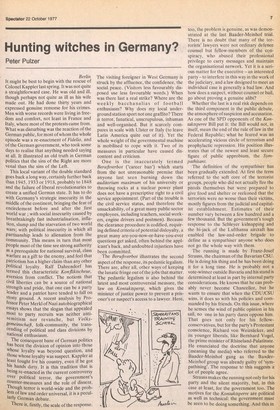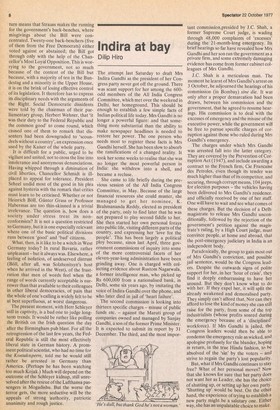Hunting witches in Germany?
Peter Pulzer
Berlin It might be best to begin with the rescue of Colonel Kappler last spring. It was not quite a straightforward case. He was old and ill, though perhaps not quite as ill as his wife made out. He had done thirty years and expressed genuine remorse for his crimes. Men with worse records were living in freedom and comfort, not least in France and Italy, where most of the protests came from. What was disturbing was the reaction of the German public, for most of whom the whole episode was a re-enactment of Fidelio, and of the German government, who took some days to realise that anything needed saying at all. It illustrated an old truth in German politics that the sins of the Right are more venal than the sins of the Left.
This local variant of the double standard goes back a long way, certainly further back than 1945, 1933 or 1918, probably to 1848 and the failure of liberal revolutionaries to create a unified German state. It has to do With Germany's strategic insecurity in the middle of the continent, bringing the fear of encirclement before and after the first world war ; with social insecurity caused by breathtakingly fast industrialisation, inflation, slump and the starvation of two world wars; with political insecurity in which all Partisanship leads to alienation from the community. This means in turn that most People most of the time see strong authority as a prerequisite for national survival, class warfare as a gift to the enemy, and feel that patriotism has a higher claim than any other Political loyalty. Ralf Dahrendorf has termed this characteristic Konfliktscheue, aversion from conflict. The notions that civil liberties can be a source of national strength and pride, that one can be a party leader and a patriot have tended to tall on stony ground. A recent analysis by Professor Peter Merkl of Nazi autobiographical essays shows that the slogan that appealed most to party recruits was neither antiSemitism nor revanche, but Volksgemeinschaft, folk-community, the transcending of political and class divisions by national enthusiasm.
The consequent bane of German politics has been the division of opinion into those Whose loyalty was beyond question, and those whose loyalty was suspect. Kappler at least fought for his country, even if he got his hands dirty. It is this tradition that is being re-enacted in the current controversy over political terror, the government's counter-measures and the role of dissent. Though terror is world-wide and the problem of law and order universal, it is a peculiarly German debate.
There is, firstly, the scale of the response. The visiting foreigner in West Germany is struck by the affluence, the confidence. the social. peace. (Visitors less favourably disposed use less favourable words.) When was there last a real strike? Where are the weekly bacchanalias of football enthusiasm? Why does my local underground station sport not one graffito? There Is terror, fanatical, unscrupulous, inhuman and well-organised. But it scarcely compares in scale with Ulster or Italy (to leave Latin America quite out of it). Yet the whole weight of the governmental machine is mobilised to cope with it. Two of its measures in particular have caused discontent and criticism.
One is the inaccurately termed Berufsverbot ('career ban') which starts from the not unreasonable premise that anyone last seen burning down the auditorium maximum of his university or throwing rocks at a nuclear power plant does not have a prescriptive right to a civil service appointment. (Part of the trouble is the civil service status, and therefore the unsackability, of a great many public sector employees, including teachers, social workers, engine drivers and postmen). Because the clearance procedure is codified, requiring defined criteria of potential disloyalty, a great many are-you-now-or-have-you-ever questions get asked, often behind the applicant's back, and undoubted injustices have been committed.
The Beruftverbot illustrates the second aspect of the response, its pedantic legalism. There are, after all, other ways of keeping the lunatic fringe out of the jobs that matter. The pedantic legalism is also behind the latest and most controversial measure, the law on Kontaktsperrf, which gives the minister of justice power to prevent a prisoner's or suspect's access to a lawyer. Here, too, the problem is genuine, as was demonstrated at the last Baader-Meinhof trial. There is no doubt that many of the terrorists' lawyers were not ordinary defence counsel but fellow-members of the conspiracy, who abused their professional privilege to carry messages and maintain the organisational network. Yet it is a serious matter for the executive — an interested party — to interfere in this way in the work of the judiciary, and a law designed to meet an individual case is generally a bad law. And how does a suspect, without counsel or bail, go about proving a genuine alibi?
Whether the last is a real risk depends on the third component in the public debate, the atmosphere of suspicion and accusation. As one of the SPD opponents of the Kontakt,sperre Bill put it: the Bill would not, in itself, mean the end of the rule of law in the Federal Republic; what he feared was an accelerating vicious circle of terrorism and prophylactic repression. His position illustrates that of the newest and least secure figure of public approbium, the Sympathisant.
The definition of the sym'pathiser has been gradually extended. At first the term referred to the soft core of the terrorist groups, people who did not actually fire the pistols themselves but were prepared to give food and shelter or reckoned that the terrorists were no worse than their victims, mostly figures from the judicial and capitalist establishment. Estimates of their number vary between a few hundred and a few thousand. But the government's tough response to the Schleyer kidnapping and the hi-jack of the Lufthansa aircraft has enabled the law-and-order brigade to define as a sympathiser anyone who does not go the whole way with them.
The running is made by Franz-Josef Strauss, the chairman of the Bavarian CSU. He is doing his thing and he has been doing it for a long time. He is probably not a vote-winner outside Bavaria and his stand is determined at least in part by internal party considerations. He knows that he can probably never become Chancellor, but he wants to ensure that when the CDU/CSU wins, it does so with his policies and commanded by his friends. On this issue, where he senses the wind of public opinion in his sail, no one in his party dares oppose him. That goes not only for his fellowconservatives, but for the party's Protestant• conscience, Richard von Weizsacker, and its younger liberals, like Bernhard Vogel, the prime minister of Rhineland-Palatinate. He enunciated the doctrine that anyone (meaning the media) who referred to the Baader-Meinhof gang as the Baader ' Meinhof group was already guilty of 'sympathising'. The response to this suggests a lot of people agree.
Strauss makes the running not only for his party and the silent majority, but, in this case at least, for the government too. The motives for the Kontaktsperre are political as well as technical: the government must be seen to be doing something. And this in turn means that Strauss makes the running for the government's back-benches, where misgivings about the Bill were concentrated. Twenty-one back-benchers (five of them from the Free Democrats) either voted against or abstained; the Bill got through only with the help of the Chancellor's Most Loyal Opposition. This is worrying to the government, not so much because of the content of the Bill but because, with a majority of ten in the Bundestag and a minority in the Upper House, it is on the brink of losing effective control of its legislation. It therefore has to express its disciplinary needs with the arguments of the Right. Social Democratic dissidents were told by the chairman of their parliamentary group, Herbert Wehner, that 'it was their duty to the Federal Republic and the common good' to come round, which caused one of them to remark that dissenters had been downgraded to 'scoundrels without a country', an expression once used by the Kaiser of the whole party.
It is difficult for a public, urged to be vigilant and united, not to cross the line into intolerance and anonymous denunciations. Having whipped through a diminution of civil liberties, Chancellor Schmidt is illplaced to appeal for tolerance. President Scheel undid most of the good in his plea against hysteria with the remark that critics must learn to be criticised. Whether or not Heinrich Boll, Giinter Grass or Professor Habermas are too thin-skinned is a trivial irrelevance. The question is, how does a society under stress treat its nonconformists? It is not a question restricted to Germany, but it is one especially relevant where one of the basic political divisions runs between 'good' and 'bad' citizens.
What, then, is it like to be a witch in West Germany today? In rural Bavaria, rather unpleasant — but it always was. Elsewhere, a feeling of isolation, of undeserved distrust (Boll, after all, was Solzhenitsyn's host when he arrived in the West), of the frustration that men of words feel when the range of words currently acceptable is narrower than that available to their colleagues in other liberal democracies, of pain that the whole of one's calling is widely felt to be at best superfluous, at worst dangerous.
The present moment, with Herr Schleyer still in captivity, is a bad one to judge longterm trends. It would be rather like polling the British on the Irish question the day after the Birmingham pub blast. For all the retrogression of the last few years, the Fed eral Republic is still the most effectively liberal state in German history. A prom inent political scientist, who had no time for the Kontaktsperre, told me he would still rather be arrested in Germany than America. (Perhaps he has been watching too much Kojak.) Much will depend on the outcome of the Schleyer kidnap, still unresolved after the rescue of the Lufthansa passengers in Mogadishu. But the worse the :terror gets, the more seductive will be the appeals of strong /authority, patriotic unanimity and rough justice.



































 Previous page
Previous page